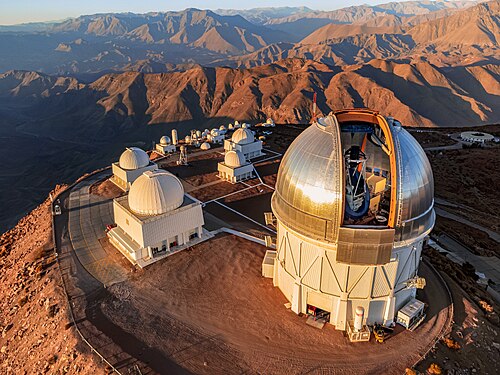Víctor M. Blanco Telescope
 Víctor M. Blanco Telescope | |
| Alternative names | Victor M. Blanco Telescope |
|---|---|
| Named after | Víctor Manuel Blanco |
| Part of | Cerro Tololo Inter-American Observatory Dark Energy Survey |
| Location(s) | Chile |
| Coordinates | 30°10′11″S 70°48′24″W / 30.16967°S 70.80653°W |
| Organization | NOIRLab |
| Altitude | 2,207 m (7,241 ft) |
| Built | 1974–1976 |
| First light | 1976 |
| Telescope style | Ritchey–Chrétien telescope |
| Diameter | 4,022.9 mm (13 ft 2.38 in) |
| Collecting area | 10.014 m2 (107.79 sq ft) |
| Enclosure | spherical dome |
| Website | noirlab |
| | |
The Víctor M. Blanco Telescope, also known as the Blanco 4m, is a 4-metre aperture telescope located at the Cerro Tololo Inter-American Observatory, Chile on the summit of Mt. Cerro Tololo. Commissioned in 1974 and completed in 1976,[1] the telescope is identical to the Mayall 4m telescope located on Kitt Peak.[2][3][4] In 1995 it was dedicated and named in honour of Puerto Rican astronomer Víctor Manuel Blanco.[5] It was the largest optical telescope in the Southern hemisphere from 1976 until 1998, when the first 8-metre telescope of the ESO Very Large Telescope opened.
Currently the main research instrument used at the telescope is the Dark Energy Camera (DECam), the camera used in the Dark Energy Survey. DECam saw its first light in September 2012.[6][7]
The Mosaic II camera was used at this CTIO 4-m telescope in the southern hemisphere since 1999.[8] This was a development of the KNPO Mosaic camera installed in 1998 in the northern hemisphere.[8] These cameras were used for various astronomical surveys, and were noted for their success.[8]
-
the Víctor M. Blanco 4-meter telescope on the summit of Mt. Cerro Tololo (foreground) with many other NOIRLab-operated telescopes
| # | Name / Observatory |
Image | Aperture | M1 Area |
Altitude | First Light |
Special advocate |
|---|---|---|---|---|---|---|---|
| 1. | BTA-6 (Special Astrophysical Obs) |

|
238 inch 605 cm |
26 m2 | 2,070 m (6,790 ft) | 1975 | Mstislav Keldysh |
| 2. | Hale Telescope (Palomar Observatory) |

|
200 inch 508 cm |
20 m2 | 1,713 m (5,620 ft) | 1949 | George Ellery Hale |
| 3. | Mayall Telescope (Kitt Peak National Obs.) |

|
158 inch 401 cm |
10 m2 | 2,120 m (6,960 ft) | 1973 | Nicholas Mayall |
| 4. | Víctor M. Blanco Telescope (CTIO Observatory) |

|
158 inch 401 cm |
10 m2 | 2,200 m (7,200 ft) | 1976 | Nicholas Mayall |
| 5. | Anglo-Australian Telescope (Siding Spring Observatory) |

|
153 inch 389 cm |
12 m2 | 1,742 m (5,715 ft) | 1974 | Prince Charles |
| 6. | ESO 3.6 m Telescope (La Silla Observatory) |

|
140 inch 357 cm |
8.8 m2 | 2,400 m (7,900 ft) | 1976 | Adriaan Blaauw |
| 7. | Shane Telescope (Lick Observatory) |

|
120 inch 305 cm |
~7 m2 | 1,283 m (4,209 ft) | 1959 | Nicholas Mayall |
See also
[edit]- List of largest optical reflecting telescopes
- List of astronomical observatories
- List of largest optical telescopes in the 20th century
References
[edit]- ^ Great Telescopes. (2003). In Atlas of the Universe. Retrieved from http://www.credoreference.com/entry/philipsuniverse/great_telescopes
- ^ Freeman, Ira Henry (October 28, 1979). "An Astronomical Journey in Arizona". The New York Times (Late City ed.). p. 377. ISSN 0362-4331.
- ^ "Archived copy". Archived from the original on 2011-07-27. Retrieved 2009-10-25.
{{cite web}}: CS1 maint: archived copy as title (link) - ^ Gregory, B; Abbott, T (July 22, 2008), The Blanco 4m Telescope, Cerro Tololo Inter-American Observatory
- ^ "Brief History of THE CERRO TOLOLO INTER-AMERICAN OBSERVATORY". Archived from the original on 2008-09-07. Retrieved 2008-09-07.
- ^ Dark Energy Camera and Dark Energy Survey:photos, videos & graphics fnal.gov
- ^ Berkeley Lab sensors enable first light for the dark energy camera phys.org Retrieved 2012-09-18
- ^ a b c Dey, Arjun; Valdes, Francisco (2014-03-01). "The Delivered Image Quality with the MOSAIC Cameras at the Kitt Peak 4 m Mayall and Cerro Tololo 4 m Blanco Telescopes". Publications of the Astronomical Society of the Pacific. 126 (937): 296. doi:10.1086/675808. ISSN 1538-3873.
- ^ "Explore the Universe Live with Astronomers in Chile". NOIRLab Announcement.




